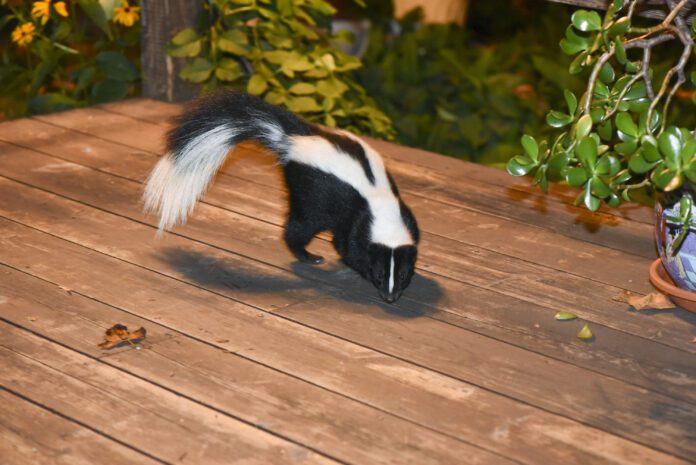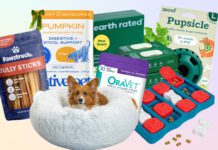When I think back to the night my dog was sprayed by a skunk, the disaster replays in my mind like a video in fast-forward.
Something furry dashed across the front porch of the Cape Cod, Massachusetts, beach house where we were staying.
“What the heck was that creature?” I thought, wondering what animal paid us a visit. But my dog didn’t want to ponder nature; he raced after the fluffy critter.
My feet hit the porch, and I ran after him, screaming, “Stop! Stop! Stop!”
Then, abruptly, the fast-forward video halts and turns into a slow-motion stress dream as a convergence of events occurred: I realized the creature was a skunk, my dog had him cornered, and we were all doomed.
I started backing up, tripping over my feet, yelling, “Nooooooooooooooooo…” But it was too late.
“Psssssssssst,” went the skunk, right into my dog’s face. He fell to the ground, rolling around on the sandy yard, trying to get the burning spray out of his eyes.
The horrific-smelling mist got me, too, and then the stench wafted through the open windows of the house.
Different voices shouted, “Oh my gosh, what happened? Are you kidding me? I’m going to throw up!” Clearly, I was never going to be invited back.
I had never had a dog sprayed by a skunk. I had no supplies, no plan, and no idea how to get rid of skunk smell. Learn from my misery and mistakes, don’t be me, be prepared.
Continue reading for expert advice on how to get skunk smell off a dog.
How To Get Rid of Skunk Smell
Two veterinarians and a dog groomer shared their go-to formulas, products, and remedies to help dogs sprayed by skunks.
“You need something to deactivate the chemical compound in skunk spray,” extension veterinarian Aly Cohen, from the Cornell University College of Veterinary Medicine, says. “It is not water soluble, so soap and water are never going to cut it. You need something that will oxidize the chemicals.”
Homemade Skunk Smell Removing Solutions
You can whip together a homemade concoction of simple ingredients to help remove skunk smell from a dog.
Veterinarian Lori Teller, a clinical professor at Texas A&M University College of Veterinary Medicine and Biomedical Sciences, recommends this formula and procedure:
- 32 oz (1 liter) of 3% hydrogen peroxide
- ¼ cup baking soda
- 1-2 teaspoons liquid dishwashing soap (i.e., Dawn)
Once you’ve made the formula you’ll want to:
- Clean the dog in a well-ventilated area with good airflow
- Lather into the coat, massaging down to the skin
- Leave the lather on for 10-15 minutes
- Rinse thoroughly
- Repeat once if necessary
- Can follow with a white vinegar or apple cider rinse
- AVOID dog’s eyes and genitalia
- Do not apply hydrogen peroxide to areas with broken skin.
But Dr. Teller warns, “The most effective way to remove skunk odor from a dog is with a freshly made shampoo; do not make it and keep it stored in a container, as it could explode.”
You can keep the ingredients separately in your cabinet, but don’t mix them unless you have that “in case of emergency moment.”
The hydrogen peroxide may cause some discoloration of your dog’s fur, but that will grow out eventually.
Retail Skunk Odor Removing Solutions
There are many shampoos, conditioners, solutions, and sprays for sale that boast they’ll remove skunk smell from your dog. Our experts say some products do get the job done.
Groomer Karyn Millerick, who owns The Dirty Doodle dog salon in Stoneham, MA, has received many panicked calls from dog parents trying to clean up the aftermath of skunk spray.
Millerick swears by Nature’s Miracle Skunk Odor Control Shampoo and Conditioner.
“They have it in lavender, that’s the one you want,” Millerick says. “When I tell you we have tried everything, we have.”
Millerick recommends wearing gloves when de-skunking a dog and being strategic where you apply a shampoo or solution.
“Most of the time, skunks will hit a dog’s face,” Millerick says. “Put the shampoo on their nose, their head, and most of their face, not their eyes.”
If your dog has a strong prey drive or skunks are common visitors to your neighborhood, keep a bottle of skunk-removing shampoo around just in case.
“It’s never a convenient time when it happens,” Dr. Cohen says. “Depending on where you live and when the dog is sprayed by a skunk, the store might not be open, so they’re nice to have on hand.”
Skunk Smell Removing Critical Chemistry Lesson
Our experts say to be successful removing skunk smell from a dog, it’s critical to understand a quick chemistry lesson: Deskunking 101.
If your dog is sprayed by a skunk, apply the skunk-removing product first and let it soak in. Don’t wet their body with water initially, as this will release even more unpleasant, longer-lasting skunk odors.
There are two chemicals in skunk spray: thiols and thioacetates.
“Thiols are immediately very stinky, that’s what you recognize right away when a dog is sprayed by a skunk,” Dr. Cohen says. “Thioacetates only get stinky once they are hit with water. That’s why sometimes a dog will stay smelly if they get wet again, even after you bathe them.”
However, if a dog takes a direct hit to the eyes, immediately flush their eyes with tepid water or a sterile saline solution. Protecting their eyes takes priority over the smell.
“Skunk spray can cause caustic damage to the cornea, even ulcers, so getting it off right away to prevent any further damage is the first thing to do,” Dr. Cohen says.
Watch your dog closely once you’ve rinsed your dog’s eyes and given them the skunk smell-removing bath.
“If your dog repeatedly paws at their face, is squinting, blinking excessively, or if the eyes are swollen or cloudy, then seek urgent veterinary attention,” Dr. Teller says. “It is possible that prescription eye medication will be needed to relieve your dog’s discomfort, allow the eye to heal, and prevent long-term damage to their vision.”
Can Skunk Spray Kill a Dog?
Encounters between dogs and skunks can be fatal in rare circumstances.
Heinz Body Anemia
Those nasty chemicals in skunk spray can damage not only your dog’s eyes but also cause your dog to develop a rare but dangerous condition called Heinz body anemia, which makes it harder for red blood cells to carry oxygen.
“There have been reports of it happening when a dog had a really heavy direct spray to the face, and they probably ingested a fair amount of it,” Dr. Cohen says. “It’s pretty uncommon, but you don’t want to be the person with the uncommon dog.”
If your dog takes a direct hit to the face, you can bring them to the veterinarian to have some baseline bloodwork done and then retest in a couple of days to ensure they’re doing okay.
The signs of Heinz body anemia may not show up for several days after a skunk encounter.
“If your dog is lethargic or weak, has pale or bluish mucous membranes or appears jaundiced, has difficulty breathing or a rapid heart rate, is vomiting, or you notice reddish or brownish urine, seek immediate veterinary attention,” Dr. Teller says. “Dogs that develop anemia as a result of being sprayed by a skunk may require hospitalization, blood transfusions, IV fluids, and supportive care.”
Rabies Risk
Besides being a medium for some of the world’s worst smells, skunks are also one of the largest carriers of the rabies virus. But rabies is not transmitted through skunk spray; the virus is spread through the saliva of an infected animal. So, if your dog has any bite marks or wounds, that’s cause for concern.
“If your dog had physical contact with the skunk beyond getting sprayed, it is important to discuss this with your veterinarian,” Dr. Teller says.
Skunks generally use their spray to defend themselves and aren’t looking to fight with your dog.
“Most of the time, if your dog is getting sprayed, it’s because they didn’t take a hint and got too close to the skunk,” Dr. Cohen says. “Skunks usually are spraying from like 10 or more feet away, and they’re just trying to get away from your dog.”
Always keep your dog up to date on their rabies vaccination. If your dog has had direct contact with a skunk, consult your veterinarian about the next steps to take, including a possible rabies booster vaccination.
A dog that is not vaccinated and gets bitten by a rabid skunk (or another animal with rabies) could be at high risk of dying.
How to Avoid Skunk Encounters
Avoiding skunk encounters can help prevent a smelly disaster.
The animals live in both rural and urban settings, but there are ways to make your yard less appealing to these most unwelcome critters:
- Skunks are scavengers and will try to eat food left outside, garbage, and even compost piles. Try managing your house and the surrounding area so there’s nothing to attract them.
- Skunks like to hide. Seal off areas under your deck or house, remove wood piles where they can lurk, or even worse, nest.
- Skunks are nocturnal. “Be cautious about letting your dog out solo in the yard during peak dawn and dusk time,” Dr. Cohen says. “If your dog has to go out, perhaps try keeping them on a leash. A little bit of prevention makes a big difference.”
My Post-Skunk Spray Advice
When my dog got sprayed by a skunk, I panicked, soaked him with water, and washed him with regular dog shampoo. He smelled for the next six months, especially when he got wet.
My advice: If your dog is prone to chasing critters, keeping affordable de-skunking supplies on hand is priceless if that dreaded moment happens.
And, somehow, I did get invited back to that beach house—so did my sometimes-smelly dog, but this time I brought along a bottle of skunk-removing shampoo, just in case.






PAPER TOWELS!!!! I have had 2 dog-skunk encounters and because the spray is oily water makes it worse even when shampooing. Taking off as much of the spray BEFORE bathing is super helpful!
I found that soaking up the oil with paper towels reduces the amount of oil you have to clean with shampoos, making the shampoos much more effective. Toilet paper and newspaper will work in a pinch, too.
I start on the dog’s face, eyes first, blotting and soaking the yellow spray off (DO NOT RUB) with p.t. as this spreads the oil!) Then blot the neck, front legs, feet, and back.
Be ready to use lots of paper towels as the goal is to get it all off the dog – not spread it around. Lol. I get as much as possible blotted without rubbing the oil into my dog’s skin and then use the peroxide shampoo.
(You can tell there is little to no more oil/spray when the paper towels come back clean.)
After bathing, my dogs still skunk-stunk when they got wet, but dry they were great!! : )
We, did the “old, tried and true” method. Tomato juice and actually did fairly well, I was surprised. But then followed it up with good old standby, dog shampoo.
I lived on an acreage with lots of skunks and fortunately didn’t have it happen too many times, but when it did happen, Natures Miracle Skunk Oder Remover is the best! You apply it to your dog and let it dry. No bathing required until after the smell is gone. It really does work!